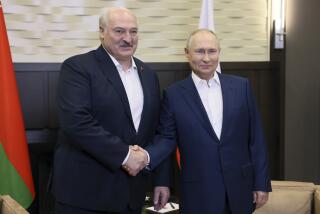Progress, by Many Measures
Five years ago, just asking an emissary from Moscow about the Soviet Union’s plans for the future of its Baltic republics would have provoked a chilly “none of your business.”
Secretary of State James A. Baker III and Foreign Minister Eduard A. Shevardnadze had such a conversation during their three days together last week. The foreign minister did not stalk out to protest U.S. meddling in internal Soviet affairs. Not only that, he ruled out the use of force as a means of pacifying the independence-minded citizens of Latvia, Lithuania and Estonia. Whether that reflects Soviet intentions is another question. But that they discussed the matter at all is nearly as impressive a sign of how much relations between the superpowers have changed as are the long list of agreements, at least in principle, on arms reductions that came of the foreign minister’s visit.
In his speech to the United Nations Monday, President Bush ticked off the results of a good week’s work--an agreement to hold a summit meeting next spring or summer, and progress in all attempts to cut nuclear forces, conventional forces and chemical weapons. But he, too, found the atmospherics as intriguing as the specifics.
“Each of these achievements is important in its own right,” he said, But they are more important still as signs of a new attitude that prevails” between the two countries. Bush also unwrapped a plan to “rid the earth of this scourge” of chemical warfare that would start with the United States cutting its poison gas stockpile by 80% if the Soviet Union cut its own chemical weapons to match the new American number. Shevardnadze said Moscow takes a “positive view” of the plan.
Bush also urged members of the U.N. to make the fight against terrorism an international effort. In another sign of change, as Bush spoke, teams of American and Soviet specialists opened a week of meetings at the RAND Corp. in Santa Monica to explore ways of joining forces against terrorism.
An important step forward came with Soviet President Mikhail S. Gorbachev’s decision not to insist on limits on America’s Star Wars missile defense program as a condition of negotiating major cuts in intercontinental nuclear missiles in both countries, the so-called START talks. He advised Bush of the decision in a letter delivered by Shevardnadze last week, along with his promise to tear down a radar installation near Krasnoyarsk in mid-Siberia that violates the 1972 treaty setting limits on missile defenses. The Soviets for a long time denied that the radar station was a violation.
What made the Soviets so willing to cooperate? One factor may be that they had more to give up in the first place than the United States. But their attitude also has roots in the early months of Gorbachev’s rule, when it became clear that the Soviet economy was a shambles. By then, it was also apparent that the edge in large-scale air and ground warfare in the future would go to the forces with the highest level of technology built into their weapons. Moscow could not hope to keep up with American advances in military technology if it diverted scarce resources to its civilian economy. It had little enough hope of keeping pace anyway, a point driven home by Monday’s announcement of an 8% emergency cut in the military budget.
As Bush noted in his U.N. address, “serious differences remain” between the two nations, but there is a welcome willingness to talk candidly about the differences, a vast improvement over the way things stood five years ago.
More to Read
Sign up for Essential California
The most important California stories and recommendations in your inbox every morning.
You may occasionally receive promotional content from the Los Angeles Times.









